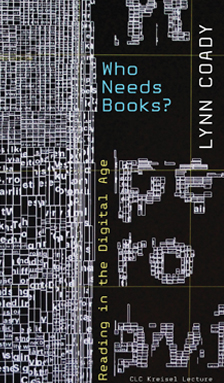
University of Alberta Press 2016/$10.95/72 pp.
Lynn Coady is the Giller Prize-winning author of Hellgoing, as well as the author of Strange Heaven and The Antagonist, so answering the titular question of her 2015 CLC Kreisel lecture-turned-essay Who Needs Books? is more than just an academic exercise. Coady examines the book as a technology, aiming to quell the fears of those who insist the end is nigh for books and reading as a whole. Her conclusion—that reading as we know it is in danger—is more comforting than it might first seem. While Jonathan Franzen and Will Self argue that the special status of the book as cultural influencer and signifier is being lost due to the proliferation of alternative entertainment—and that this is a tragedy—Coady says that what many in book culture fear is actually the loss of cultural primacy for the book. This fear is misplaced, she says, because highbrow readers have always been a relatively small group, a niche culture unlikely to be affected by the rise of other media—outside of books—where people like to read.
“Serious” literature has frequently taken a back seat to “non-serious” writing, she says, noting that current perceptions of the past’s literary greatness are an illusion, since time’s quality-filtration leaves us with only the classics and discards the dime novels and penny dreadfuls. She quotes F. Scott Fitzgerald on film in 1936, Joyce Carol Oates and E.B. White on TV, and Socrates on writing itself to make the case that fears about the end of “serious” inquiry and storytelling have always existed. But despite popular perceptions to the contrary, says Coady, statistics indicate that overall readership is up in many demographics today. Fears about the end of reading are attributable more to generational anxieties than to reality.
Coady makes a persuasive argument but doesn’t properly address some concerns about technologies. The rise of reading on screens is one; excessive screen time has been linked to a variety of brain health issues and can disrupt restorative sleep patterns. Binge reading is at worst indulgent; e-bingeing can be downright unhealthy. And physical books have more than just nostalgic appeal. At a time when search engine preferences and online suggestions use past behaviour to orient our browsing, the pleasure of stumbling across something outside our usual interests is at risk. How many children started their love affair with books by perusing their parents’ libraries? How will tomorrow’s child fare when mom’s iPad library is inaccessible because she’s always using her device?
Ultimately Coady’s argument is a reassuring dismantling of the imminent book apocalypse. Odds are, if you’ve read this far, you’ll enjoy finding out the answer to Who Needs Books?
—Andrew Guilbert is an assistant editor at Calgary’s Avenue.

